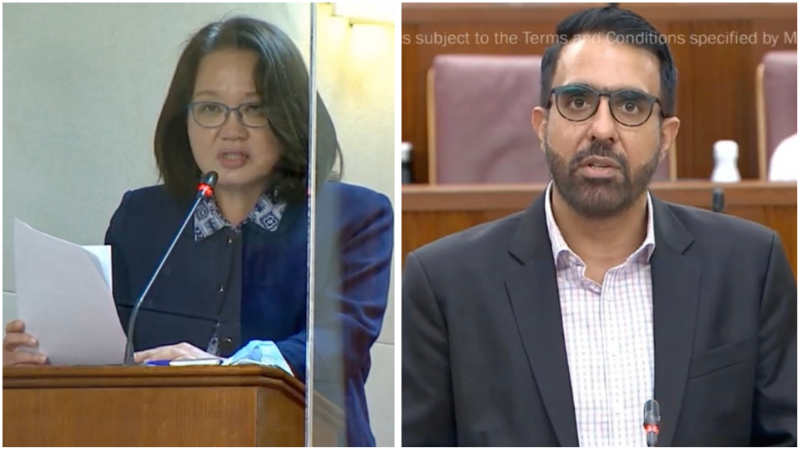She also talk about ashtrays
Good luck finding an ashtray, Singapore smokers: Amy Khor
By
Coconuts Singapore Feb 2, 2021 | 3:31pm Singapore time
[IMG alt="Senior Minister of State Amy Khor in parliament today, with ashtray bins inset. Original photo: Ministry of Communications and Information
"]
https://coconuts.co/wp-content/uploads/2021/02/amykhorbins-e1612257508622.png[/IMG]Senior Minister of State Amy Khor in parliament today, with ashtray bins inset. Original photo: Ministry of Communications and Information
Reducing ashtray bins in crowded places will help people cut down on smoking, Singapore’s Sustainability and Environment Ministry believes.
Senior Minister of State Amy Khor told parliament today that they will move public rubbish bins with mounted ashtrays to places with fewer people to discourage smokers from lighting up and protect non-smokers from secondhand smoke.
Khor did not give further details on where or when this would happen, except to say the ministry was working with relevant agencies on the plan.
“[National Environment Agency] is working with relevant agencies to relocate bins with ashtrays to places with less footfall,” she said, adding that it was also “working to distribute advisories and put up visual reminders to not smoke in prohibited areas.”
Singapore has moved hard to snuff out smoking in recent years, having banned it at more than 30,000 venues including covered walkways and bus stops, according to Khor. The minimum legal smoking age was raised from 20 to 21 last month.
Khor’s latest update on the government’s smoking clampdown came months after she told parliament in October that it would be difficult to
bust smokers in their own homes without being “intrusive,” which drew criticism from anti-secondhand smoke activists.
Other stories you should check out:
Our latest and greatest original videos
Subscribe on
‘Not fathomable or even believable’ that gov’t misspoke on TraceTogether: Singapore opposition leader
By
Coconuts Singapore Feb 2, 2021 | 7:03pm Singapore time
‘Not fathomable or even believable’ that gov’t misspoke on TraceTogether: Singapore opposition leader
Singapore’s political opposition, including leader Pritam Singh, are not letting the government off the hook for falsely telling the public that tracking data collected to fight COVID-19 would be kept out of the reach of law enforcement.
Worker’s Party chief Singh and chairman Sylvia Lim were among those in parliament today questioning why such an “efficient” government was unable to come clean about the privacy threats posed by its TraceTogether COVID-19 tracking system. The arguments came hours after the minister-in-charge of Singapore’s “Smart Nation” tech initiatives apologized for telling Singaporeans last year their data would solely be used for coronavirus contact tracing.
Singh took the floor to say people weren’t buying it, in proper parliamentarian wordiness:
“When Minister Vivian Balakrishnan admitted in Parliament that he did not consider Section 20 of the Criminal Procedure Code […] there are Singaporeans who opined that this was not fathomable or even believable, for a largely efficient government machinery that has consistently approached COVID-19 as a whole-of-government endeavor.”
“They further contend that if not ministers, at least the officials in the Ministry of Home Affairs, the Ministry of Health, and GovTech, who conceived TraceTogether, would have known of the privacy considerations surrounding TraceTogether,” he added, urging those holding power to be more transparent with how people’s personal information is used.
Still, he was ready to give them some benefit of the doubt.
“While there was no dishonesty or malice, there was a lack of care or diligence in accurately communicating the potential use of data collected by TraceTogether,” he later added diplomatically.
Singh and others were debating a bill to curtail the use of TraceTogether data to the investigation of seven specific areas of investigation: weapons use, terrorism, murder, drugs, fugitives, abduction, and sexual assaults.
Singh’s fellow party member Sylvia Lim, who used to be on the police force herself, pointed out that the government should have been clear about its use of the data from the start to avoid public uproar.
“But the bigger question is, for all these months, why did no one in the government step forward to correct the misrepresentation that TraceTogether was fully ringfenced for COVID tracing?”
Singaporeans only learned that the police could access their data – which includes the time and place of their whereabouts at all times – nearly a year after TraceTogether was launched.
Lim went on to say that she was skeptical about how useful TraceTogether would be for the police considering its limitations, since people could still turn off the app or leave the physical token at home. Of the seven categories of crimes spelled out in the bill, Lim said their scope was imprecise and therefore open to “some ambiguity and uncertainty in application.”
Other critics of the amendments included Gerald Giam of the Workers’ Party, who signaled he may still support it, and Progress Singapore’s Leong Mun Wai, who was definitely against it.
Before the debate, Minister Balakrishnan acknowledged the controversy and took responsibility for what he chalked up to a government error.
“I take full responsibility for this mistake, and I deeply regret the consternation, the anxiety, that was caused by my mistake,” he said prior to today’s debate.
That TraceTogether would only be used to contain COVID-19 was one of the selling points made by the government last year in urging the public to adopt it.
Balakrishnan announced in December that 70% of Singapore’s population had adopted the tracking system, which was one of the conditions for the country to further ease COVID-19 rules.
Singapore has reported nearly 60,000 COVID-19 cases and 29 deaths since the outbreak began last year, though new cases have slowed to a trickle in recent weeks.
Other stories:
